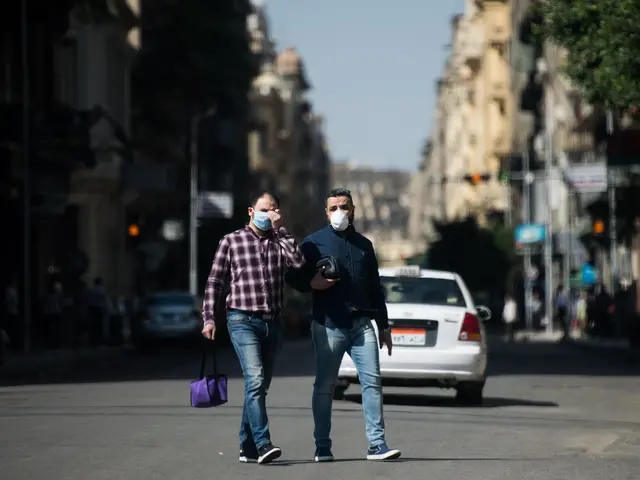The Egyptian government is trying to strike a balance between implementing precautionary measures to fight COVID-19 pandemic and gradually resuming economic activities to maintain the country's economic growth.
Ahead of the Muslim holy month of Ramadan that started on April 24, the government announced extending a previously imposed nighttime curfew but reducing it from 10 to nine hours and relaxing some restrictions related to the novel coronavirus.
While announcing the easier curfew, Egyptian Prime Minister Mostafa Madbouly said on April 23 that the government is working on resuming economic activities gradually after Ramadan.
On Sunday, Egyptian cabinet spokesman Nader Saad told a TV channel that the coming period will see "gradual return of normal everyday life in Egypt" while observing caution and implementation of the precautionary measures.
The new curfew starts at 9 p.m. and ends at 6 a.m. local time.
"This is the right thing to do, for we don't want to come out of the COVID-19 crisis with a devastated economy," said Rashad Abdo, economics professor at Cairo University and head of the Egyptian Forum for Economic and Strategic Studies.
Abdo said that Egypt's economic reform measures over the past three years increased the foreign currency reserves, boosted tourism and exportation and increased the remittances of Egyptian expatriates before the COVID-19 crisis.
"This is why a recent report released by the International Monetary Fund predicted Egypt to be the only country with a positive economic growth in 2020," the economics professor told Xinhua.
"Striking a balance between fighting COVID-19 and maintaining production is necessary. It is also a global trend," Abdo said.
The pandemic infected nearly 2.9 million people worldwide, with a global death toll of more than 200,000.
Egypt's first COVID-19 case was announced in mid-February.
Until Sunday night, the total number of infections registered in the country reached 4,534, including 317 deaths and 1,176 recoveries.
"The number of cases in Egypt is not alarming. Seasonal flu infects more people than the novel coronavirus does," said Egyptian microbiology and immunity professor Ali Mohamed Zaki.
Zaki, who contributed to the discovery of Middle East Respiratory Syndrome (MERS), expressed his belief that Egyptians can start getting back to work, describing the situation in Egypt as "safe."
"Many Egyptians use the subway and go to marketplaces before the curfew hours, and if the situation was serious there would have been much more infections," Zaki told Xinhua.
He added that Egypt managed to deal with the pandemic successfully and control its outbreak, expecting a gradual decline of COVID-19 cases due to the country's summer hot weather.
"For me, I believe that the novel coronavirus in Egypt is almost over and is in a stage of coming to an end," Zaki reassured.
Since mid-March, Egypt has been implementing temporary closure of schools and universities, government services, entertainment places, restaurants, malls, museums and archeological sites, besides suspending flights and halting sports activities, to curb the outbreak of the virus.
On Sunday, the government started resuming suspended government services and reopening closed offices such as traffic department, real estate and vehicle registration offices as well as some courts.
Nahla Abdel-Wahab, microbiology and immunology consultant at Cairo University Hospitals, recommended that people can gradually resume their work but not at full capacity while sticking to the precautionary measures.
"Reducing the number of employees in each shift is a good idea. Yet, those who go to work should repeatedly wash their hands, wear face masks, keep a distance from others and avoid crowds," she said, adding that those who have flu symptoms are recommended to stay at home.
Egyptian health officials and medics work nonstop, which is why the World Health Organization has praised Egypt's efforts in dealing with the pandemic, according to Abdel-Wahab.
"Work and production can be resumed while maintaining implementation of the precautionary measures," the microbiology and immunology consultant told Xinhua.
(by Mahmoud Fouly)
 简体中文
简体中文





